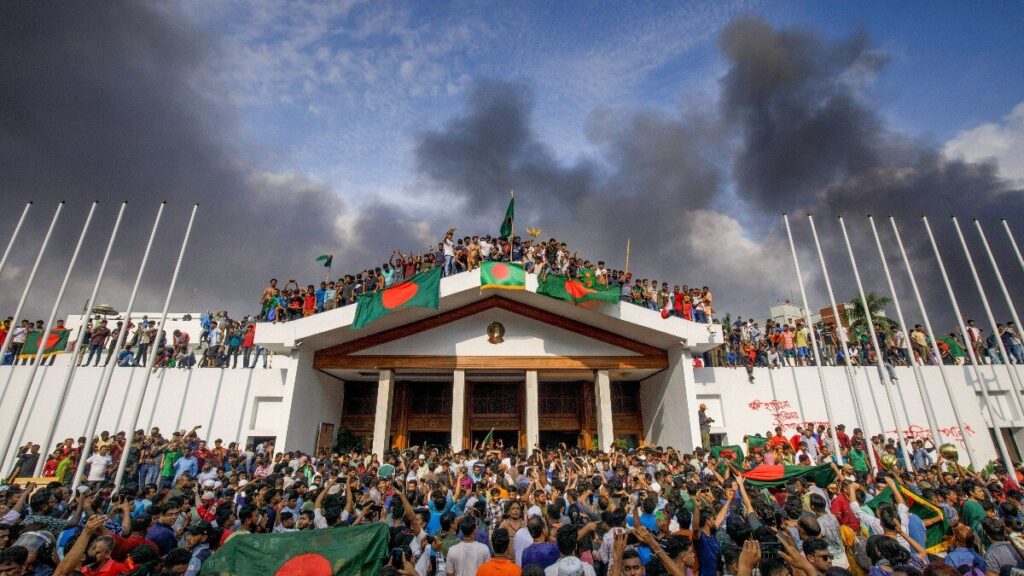Politics is like a game of snakes and ladders. Sometimes you rise from rags to riches when you get a chance, and sometimes the situation is such that you are sitting at the top but with a jolt you reach zero. A zero where you have neither a move nor a pawn left. Such is the situation of Bangladesh’s former PM Sheikh Hasina these days. Sheikh Hasina, who formed the government with a huge majority just 8 months ago, is so helpless today that she has had to leave her country. But the most important question in all these developments is about the future of Bangladesh. The future on which many countries have their eyes. In such a situation, the most important question is whether fundamentalism will come in Bangladesh or democracy will be restored. To understand this story, we have to go back 53 years.
The future of Bangladesh was decided by ‘one sentence’
When Bangladesh came into existence in 1971, a statement of the country’s founder Bangabandhu Sheikh Mujiburahman became quite famous, in which he said that Bangladesh does not belong to Hindus or Muslims, but to all those who call this country their own. This one sentence shaped the entire story of the country’s intentions, its character and future. On the other hand, there were organizations like Jamaat-e-Islami, which opposed the independence of Bangladesh.
Meanwhile, just four years after the formation of Bangladesh, Sheikh Mujibur Rahman was assassinated along with his family. This assassination made it clear that the Bangladesh that Sheikh Mujibur Rahman was dreaming of was not so easy to successfully achieve.
Related news
- Ampox is once again raising concerns, WHO has declared it a public health emergency for the second time in two years
- LIVE: Angry crowd entered the hospital after doing RG in Kolkata, protesters vandalized it
- Genocide case filed against Sheikh Hasina in International Criminal Tribunal, interim government will conduct investigation under UN supervision
- Mahindra Thar Roxx: Mahindra’s blast! 5 door Thar Roxx launched at a very low price, features are amazing
- Jharkhand: Lightning struck the ground during a match in Simdega, 3 hockey players died
Jamaat was against the independence of Bangladesh
Turning the pages of history, we come to know that during the 1971 war, Jamaat activists were with the Pakistani army in mass murders and rapes in East Pakistan. This organization has long been demanding the advocacy of Sharia law in Bangladesh. Jamaat Shibir (Jamaat Camp) targeted the intellectuals of Bangladesh and even got them killed.
Sheikh Hasina imposed a ban on Jamaat
Sheikh Hasina recently banned Jamaat-e-Islami and its student wing Islami Chhatra Shibir under the anti-terrorism law. It is said that after this the situation in Bangladesh worsened further.
What after Sheikh Hasina?
To understand this, it is important to understand two things. First, how has been the leadership of Sheikh Hasina and second, what is the atmosphere in the country without Sheikh Hasina. On one hand, there was Sheikh Hasina who always tried to rein in the fundamentalists in the country. Not only this, her strategy was always to maintain a balance between China and India. After the formation of the Awami League government in 2009, many improvements have also been made. These include movement of goods, use of ports and reduction in cases of extremism on the border etc. However, many issues including water sharing remained unresolved.
On the other hand, there is the BNP government. BNP is not only supported by Pakistan but also by China. It talks about Islamic politics. The past shows that the government before Hasina played an important role in giving shelter to separatists in North East India.
What is the meaning of Khaleda Zia’s release
The order to release former Prime Minister and opposition leader Khaleda Zia is enough to tell what today’s Bangladesh thinks and what will be the stand of the interim government. As soon as Sheikh Hasina left the country, the President of the country, after consultation with the opposition parties, ordered the release of Khaleda. It is believed that Khaleda Zia is more inclined towards China and Pakistan.
Some photos also attracted attention
After the coup, a picture of Bangladesh President Mohammad Shabuddin caught everyone’s attention. In this, the President was seen surrounded by the army. Whether it was the order to release Khaleda or the announcement of dissolving the current parliament, the army was seen standing behind him every time. In such a situation, it has been announced that an interim government will be formed in Bangladesh. But it is not yet clear what its form will be. Many countries including America are appealing for the restoration of democracy in Bangladesh. But the kind of atmosphere that has been created does not make the situation of this country pleasant.
Source (PTI) (NDTV) (HINDUSTANTIMES)
